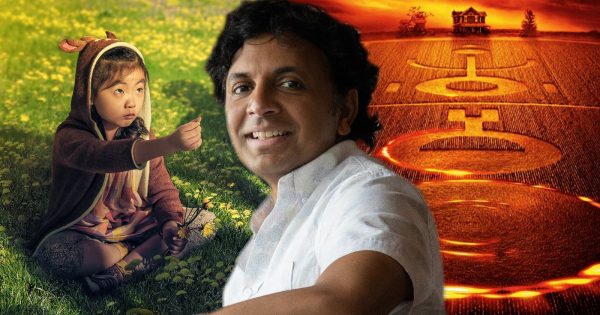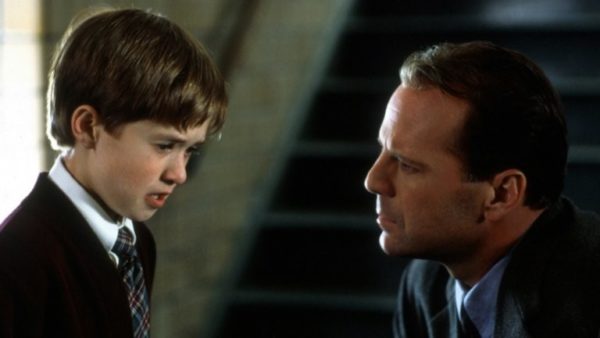EJ Moreno believes its time that M. Night Shyamalan receives the respect he deserves…
Lady In The Water. The Happening. The Last Airbender. These are arguably the lowest points in the filmography of M. Night Shyamalan.
Shyamalan helmed fifteen feature films in his career, and the entire perception of this filmmaker fell into such negativity because of just a handful of less-than-stellar movies.
Yes, those listed films are often considered some of the weaker films of the 00s, but those are just a few examples in a career spanning decades. It’s sad to see that we’ve let one of the greatest filmmakers of this generation go under-recognized for so long.
With the release of his new film Knock At The Cabin, the time to give Shyamalan his flowers is now.
M. Night Shyamalan didn’t simply fall into the thriller and horror genre that would make him famous. The filmmaker would start with a semi-autobiographical drama and a family religious drama before taking time to create a spec script for the now-iconic The Sixth Sense.
With this film, we’d see Philadelphia-raised Shyamalan storm onto the Hollywood film scene, scaring up insane numbers and accolades. In one of the most memorable years for movies, this horror-filled drama became the second-highest-grossing film of 1999 and walked away with six Academy Awards nominations.
The Sixth Sense showed the world that Shyamalan understood his tone, style, and his infamous plot twists. While he’d change up the stories, we’d see everything we’d come to love (or hate) about Shyamalan with this film, and he’d cement it further with the follow-up Unbreakable.
There’s no denying that Unbreakable had a solid showing upon release, but it didn’t hit audiences the way The Sixth Sense did. We’d see the cult-like following grow for this film over the years, a story that rings true for many of Shyamalan’s work. This filmmaker often lives by the mentality, “I’m going to give you what you need, not what you want.” You may not think this film is what you’re craving, but it will hit you sooner or later that this man was cooking up something fire.
Things get a bit unpredictable with the next few films, as Shyamalan revisits familiar themes and puts the plot twists to the forefront of the projects.
I believe the next two M. Night Shyamalan movies are some of his strongest, mainly because we see a more confident but restrained artist. The story of over-produced work will come into play soon, but with Signs and The Village, the filmmaker shines in the perfect filmmaking setting he’ll later make his home.
Signs is easily a top-tier entry from Shyamalan, and it confuses me how anyone can see this movie and call him a bad director. There’s a simplistic quality that we don’t often see in an alien film: this isn’t about trying to save the entire world in an epic battle or a horrific body horror movie about aliens invading; it’s just a story about a family trying to survive. You feel for this family, not only for the aliens they are facing off but the interpersonal drama we see brilliantly displayed throughout.
Strong acting and stellar filmmaking helped Signs further cement Shyamalan’s then-box office stability. But there was starting to be a bit of a conversation about the script and how the story unfolded, a conversation that would pick up steam even more with 2004’s The Village.
Just getting out of the way, no matter how divisive The Village can be, there’s no denying the brilliant filmmaking on display. The acting from the entire cast impresses, the score went on to be Oscar-nominated, and the aesthetic as the whole of the film was pitch perfect for what Shyamalan was attempting. But this was the first time that the script and the plot twist, in particular, came to bite M. Night Shyamalan in the ass. People despised the twist here, from critics to the general public. It shocked many, and it began to sully the name.
That felt a bit unfair; even if you didn’t personally enjoy the twist, it didn’t feel like enough to lower the appeal of Shyamalan’s work as much as this did. The backlash for this could explain the next few years and why it took the filmmaker a lot longer to find his groove again.
From 2006 to 2013, M. Night Shyamalan released four movies, each more critically and commercially panned than the next. As the budgets increased, so did the backlash to the filmmaker’s work. It wasn’t like some of the criticism wasn’t deserved; defending films like 2006’s Lady in the Water and The Last Airbender from 2010 isn’t easy.
Still, it felt like the public wrote off Shyamalan forever and saw 2013’s After Earth as the final straw. Even though a little over a decade ago, there was talk of Shyamalan being the next Steven Spielberg, and now, everyone was quick to write him off.
We still see articles saying, “can we ever trust M. Night Shyamalan again,” like the filmmaker was abusing people through his work. There’s no doubt that many former Hollywood darlings end up on the shit list for many, but the way people were so harsh to Shyamalan felt utterly unneeded. We saw a genuine attempt to discredit the work that he built in the early part of his career, and Shyamalan did not take it lightly…he came back with force only two years later.
The modern era of M. Night Shyamalan’s work is one hot streak of films. Starting with 2015’s The Visit, the writer/producer/director entered a new mindset with his production style and found a new home at Universal. We’d see Shyamalan put his own money into filmmaking and start to go back to his roots.
The Visit played like a classic horror film, especially when Shyamalan dropped his signature dark humor and uber scares. Even when adapting a modern style of filmmaking like found footage, Shyamalan never lost his footing and seemed more comfortable than ever. Audiences loved his 2015 entry, and the positivity would keep on with Split, the 2016 film that would forever cement the filmmaker’s legacy with me.
Split is a near-perfect thriller, ranking next to The Sixth Sense as one of his most important stories. What this did best was give more actors time to shine under the direction of Shyamalan. From what we give him about his stories, there’s never enough conversation about the direction of talent. James McAvoy is giving a masterclass here, dipping into personas easily while never slipping into camp territory.
Throughout his career, acting in M.Night’s movies is often a high point, from Joaquin Phoenix in Signs to the entire cast of The Sixth Sense. Sadly, this part of his filmmaking has been ignored for far too long, though people have noticed with the latest, Knock At The Cabin, and Dave Bautista’s stellar performance.
This also created the first Shyamalan franchise, as it connected to the 2000 film Unbreakable and would see a sequel titled Glass. We saw the Eastrail 177 Trilogy not only let Shyamalan play within a world unlike ever before, but he was also given a chance to commentate on superhero movies and the state of modern cinema. He had hit a new level, and it was almost like a victory lap for his hard work throughout the years. Shockingly, the reception wasn’t all that great for Glass, but I predict a critical reevaluation in the coming years.

Now, all of this comes together for the perfect storm, Knock At The Cabin. The latest from Shyamalan is my favorite since Split, but also a top-three entry for me.
Everything we love about the writer and director is on display; the acting is incredible and intense, the plot makes you question everything you know, and the ending is as divisive as any other film he’s made. Yet, it feels like the plot twists, and having a “gotcha” moment takes a back seat to deliver a message of hope.
With Old and this new film, M. Night Shyamalan is reflecting on life and mortality and putting a heavier focus on families. As he gets older, the questions he presents in his films feel more mature and focused, making the plots feel a bit stronger in the end. It’s a solid new plan for the filmmaker, and it seems like it’s carrying to some of the most intriguing work of his career.
If we keep getting movies like Knock At The Cabin, articles like this won’t be needed, and we’d all remember to put some respect on one of the important filmmakers of our time.
EJ Moreno

















